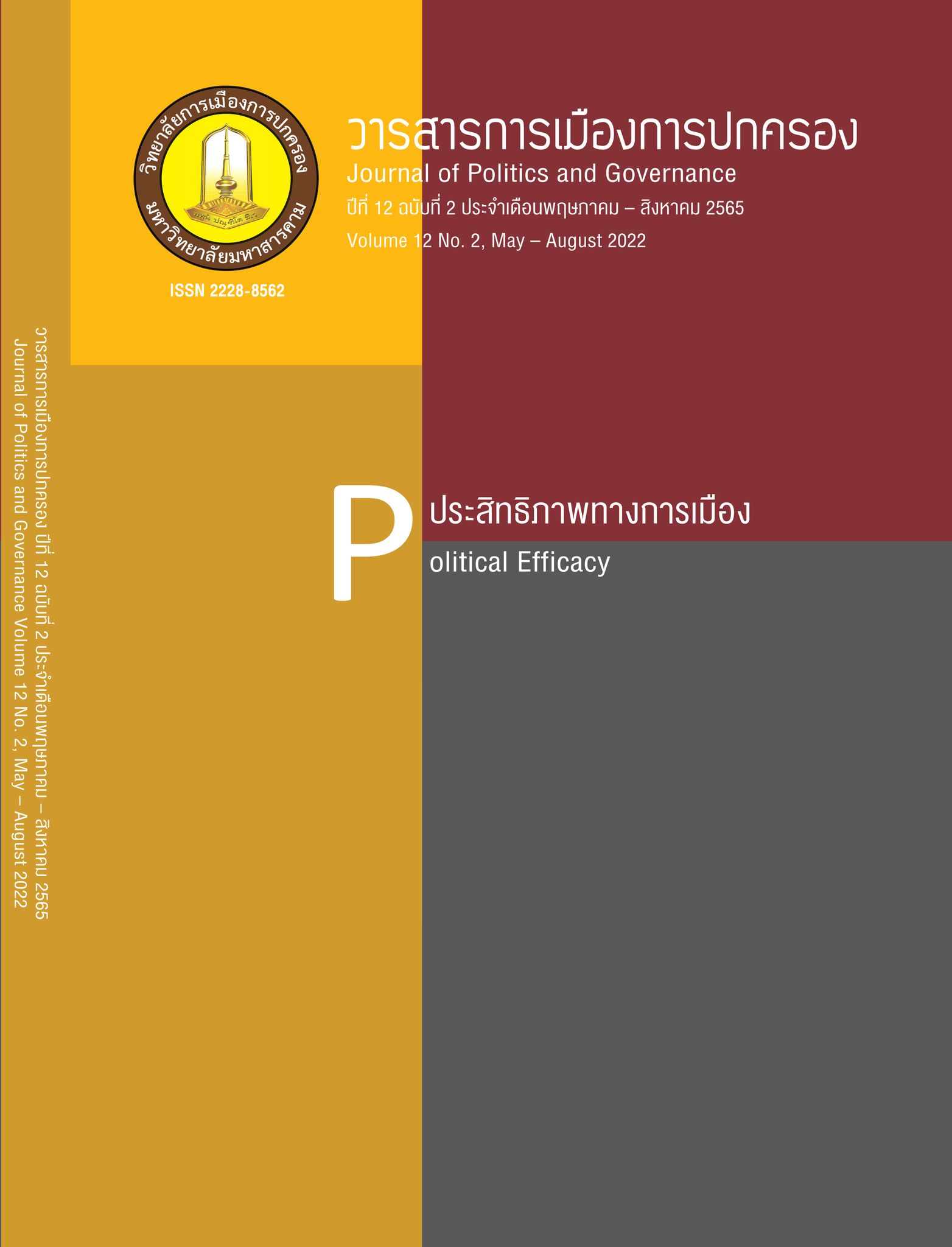Guidelines for Phetchaburi Development by the Civil Society and Geo-Public Administration of Phetchaburi Province
Main Article Content
Abstract
The purposes of this research were (1) to analyze the civil society, and the geo-public administration of Phetchaburi Province, (2) to discuss the ways to develop the city’s civil society and the geo-public administration of Phetchaburi Province, and (3) to offer concrete ways to develop the city’s civil society and the geo-public administration of Phetchaburi Province. The study was qualitative research conducted using documents and in-depth interviews. People who gave key information to this research included academic experts, historians, residents’ philosophical ideas as well as senior residents, and a selected community group. The research results revealed that the community thoughts included traditional festivals, jobs, local games ideas, and technology. These communal activities created a bond in the group that shared, promoted and continued knowledge as well as worked with the government sectors. The thought processes of the geo-public administration of Phetchaburi Province included the theological thoughts, geographic location, population density, landscape, and history. These all had some level of interaction to the administration; where geographical location did create a community of resources and funds. Moreover, the results showed that the development of Phetchaburi Province from the concept of “The extent of knowledge” was under the principle of mutual residents’ rights creating an understanding that the locals were the key to funding, identity and relationship with other organizations to the city. “The extent of performance” was under the individuals with the participation and promotion of the city’s concepts and identities that signified the norm of Phetchaburi residents. “The extent of knowledge” was under a managing principle to develop areas and adapt to public campaigns. “The extent of performance” was under a signified principle of the improvement of the geo-public administration patterns tied with the improving standard of living to the city and development plans. Finally, the processes of development from the communal ideas included the identity of the city, the use of public spaces in the city, and the development of funds in the administration. The development of ideas geo-public administration included the interaction of analyzed plans, interaction to the Southern cities and the interaction to the hygienic, and happy place.
Article Details
References
เกรียงไกร เกิดศิริ. (2559). ข้อแนะนำเกี่ยวกับภูมิทัศน์เมืองประวัติศาสตร์. หน้าจั่ว: ว่าด้วย สถาปัตยกรรม การออกแบบ และสภาพแวดล้อม .30 (มกราคม – ธันวาคม 2559), 29.
คณะกรรมการฝ่ายประมวลผลเอกสารและจดหมายเหตุ. (2544). วัฒนธรรม พัฒนาการทางประวัติศาสตร์ เอกลักษณ์และภูมิปัญญา จังหวัดเพชรบุรี. กรุงเทพมหานคร: กรมศิลปากร.
คณะกรรมการอำนวยการกลางโครงการความร่วมมือทางวิชาการระหว่างกรมส่งเสริมการปกครองส่วนท้องถิ่นกับสถาบันการศึกษา. (2551). เอกสารตำราหลัก ประกอบการเรียนการสอนหลักสูตรรัฐประศาสนศาสตรบัณฑิต สาขาการปกครองท้องถิ่น วิชากลยุทธ์การวางแผนพัฒนาพื้นที่ท้องถิ่นเชิงบูรณาการ. กรุงเทพมหานคร: บริษัท แอคทีฟ พริ้นท์ จำกัด.
จรัส สุวรรณมาลา. (2560). รายงานการประชุม symposium “ท้องถิ่นไทยกับการสร้างเมืองสำหรับอนาคต”. จัดโดยสำนักงานปลัดสำนักนายกรัฐมนตรี ร่วมกับ คณะรัฐศาสตร์ จุฬาลงกรณ์มหาวิทยาลัย วันที่ 7 พฤศจิกายน 2560 คณะรัฐศาสตร์ จุฬาลงกรณ์มหาวิทยาลัย.
จังหวัดเพชรบุรี. (2525). สมุดเพชรบุรี 2525. กรุงเทพมหานคร: โรงพิมพ์เรือนแก้วการพิมพ์.
ชาย โพธิสิตา. (2549). ศาสตร์และศิลป์แห่งการวิจัยเชิงคุณภาพ (พิมพ์ครั้งที่ 2). กรุงเทพมหานคร: บริษัท อมรินทร์พริ้นติ้งแอนด์พับลิชชิ่ง จำกัด (มหาชน).
ติน ปรัชญพฤทธิ์. (2555). การบริหารการพัฒนา ความหมาย เนื้อหา แนวทางและปัญหา (พิมพ์ครั้งที่ 13). กรุงเทพมหานคร: โรงพิมพ์แห่งจุฬาลงกรณ์มหาวิทยาลัย.
ทิพวรรณ หล่อสุวรรณรัตน์ และสุขยืน เทพทอง. (2555). การบริหารรัฐกิจร่วมระหว่างรัฐบาลเอกชนและประชาสังคม. สืบค้นจาก http://202.44.73.6/upload/file/Tippawan_article/2552_ThaiArticle_PublicAdministration_tippawan.pdf
ปิยธิดา ปูชนียพงษกร. (2556). การประยุกต์ใช้แนวคิดการเติบโตอย่างชาญฉลาดเพื่อกำกับการแพร่กระจายของมหานครในภูมิภาค: กรณีศึกษานครสุราษฎร์ธานี. สาขาวิชาการวางแผนชุมชนเมืองและสภาพแวดล้อม ภาควิชาการออกแบบและวางผังชุมชนเมือง บัณฑิตวิทยาลัย, มหาวิทยาลัยศิลปากร.
ปรีดี พิศภูมิวิถี. (2557). ตามรอยฝรั่ง เล่าความหลังเมืองพริบพลี (เพชรบุรี). นครปฐม: บริษัท บุญเจริญ อินเตอร์เทรด จำกัด.
พิชญ์ พงษ์สวัสดิ์. (2560). แถลงการณ์ว่าด้วยเรื่องนคราภิวัฒน์ การพัฒนาเมือง และสุขภาวะเมืองของไทย เมือง กิน คน. กรุงเทพมหานคร: หจก. โรงพิมพ์วัชรินทร์ พี.พี.
พนิต ภู่จินดา, และยศพล บุญสม. (2559). แนวคิดการพัฒนาเมืองต้นแบบ (Urban Design Guideline for Specific Purposed Town). วารสารวิชาการการออกแบบสภาพแวดล้อม, 3(1), 25-27.
วสันต์ ปวนปันวงศ์. (2560). การพัฒนาพื้นที่ชนบทให้กลายเป็นเมือง กรณีศึกษาแหล่งท่องเที่ยวดอยม่อนแจ่ม อำเภอแม่ริม จังหวัดเชียงใหม่. วารสารรัฐศาสตร์และรัฐประศาสนศาสตร์, 8(2), 55-80.
วันชัย ริมวิทยากร. (2541). เศรษฐศาสตร์เมือง (พิมพ์ครั้งที่ 3). กรุงเทพมหานคร: สำนักพิมพ์มหาวิทยาลัยรามคำแหง.
ศิรินภา สถาพรวจนา. (2541). การมีส่วนร่วมทางการเมืองของประชาชนจังหวัดเพชรบุรี: กรณีศึกษากลุ่มคนรักเมืองเพชร. สังคมวิทยาและมานุษยวิทยามหาบัณฑิต
คณะสังคมวิทยาและมานุษยวิทยา มหาวิทยาลัยธรรมศาสตร์.
เอนก เหล่าธรรมทัศน์. (2560). เมืองนิยม (พิมพ์ครั้งที่ 2). ปทุมธานี: มูลนิธิสถาบันสร้างสรรค์ปัญญาสาธารณะ.
เอนก เหล่าธรรมทัศน์. (2558). เมืองย้อนคิด มุ่งสู่อนาคต. นนทบุรี: บริษัท มาตาการพิมพ์ จำกัด.
เอนก เหล่าธรรมทัศน์. (2542). ขบวนการประชาสังคมไทย: ความเคลื่อนไหวภาคพลเมือง. นครปฐม: บริษัท อมรินทร์พริ้นติ้ง แอนด์ พับลิชชิ่ง จำกัด.
เอนก เหล่าธรรมทัศน์. (2559). แนวคิดเรื่องประชาสังคม. สืบค้นจาก http://www.ldi.or.th
Lefebvre, Henri. (2003). The Urban Revolution. London: London School of Economics.
Marcus Grant, Helen Lease, Gabriel Scally, Erica Ison, Jean Simos, Lucy Spanswick & Nicola Palme. (2014). World Health Organization Regional Office for Europe “Healthy Cities Promoting health and equity-evidence for local policy and practice”. Summary evaluation of Phase V of the WHO European Healthy Cities Network. UN City: Denmark.
Rajesh Tandon and Ranjita Mohanty. (2000). CIVIL SOCIETY AND GOVERNANCE A RESEARCH STUDY IN INDIA. Part of Global Comparative Research Study on Civil Society and Governance Co-ordinated by IDS, Sussex, UK. Tughlakabad Institutional Area, New Delhi: Society for Participatory Research in Asia (PRIA).
Rawiwan Oranratmanee. (2015). Dynamics of Old Districts in Thai Conservation Cities. Journal of Mekong Socletles , 11(2), 108-109.
บทสัมภาษณ์
ธานินทร์ ชื่นใจ. (2562, 12 พฤศจิกายน). ช่างงานจิตกรรมไทย, งานลายรดน้ำ. [บทสัมภาษณ์].
ทวีโรจน์ กล่ำกล่อมจิตต์. (2562, 31 มกราคม). นักประวัติศาสตร์ท้องถิ่น. [บทสัมภาษณ์].
ทวีโรจน์ กล่ำกล่อมจิตต์. (2562, 19 พฤศจิกายน). นักประวัติศาสตร์ท้องถิ่น. [บทสัมภาษณ์].
บุญชู มิตรมาก. (2563, 22 กรกฎาคม). ปราชญ์ชาวบ้าน, ผู้อาวุโส, หมอขวัญข้าว (ผู้ประกอบประเพณีรับขวัญข้าว). [บทสัมภาษณ์].
ล้อม เพ็งแก้ว. (2562, 19 พฤศจิกายน). ข้าราชการเกษียณ, ปราชญ์ชาวบ้าน. [บทสัมภาษณ์].
เอนก เหล่าธรรมทัศน์. (2561, 12 กุมภาพันธ์). ศาสตราจารย์ (พิเศษ), ผู้อำนวยการหลักสูตรปรัชญาดุษฎีบัณฑิต สาขาวิชารัฐประศาสนศาสตร์. [บทสัมภาษณ์].
เอนก เหล่าธรรมทัศน์. (2562, 28 เมษายน). ศาสตราจารย์ (พิเศษ), ผู้อำนวยการหลักสูตรปรัชญาดุษฎีบัณฑิต
สาขาวิชารัฐประศาสนศาสตร์. [บทสัมภาษณ์].


